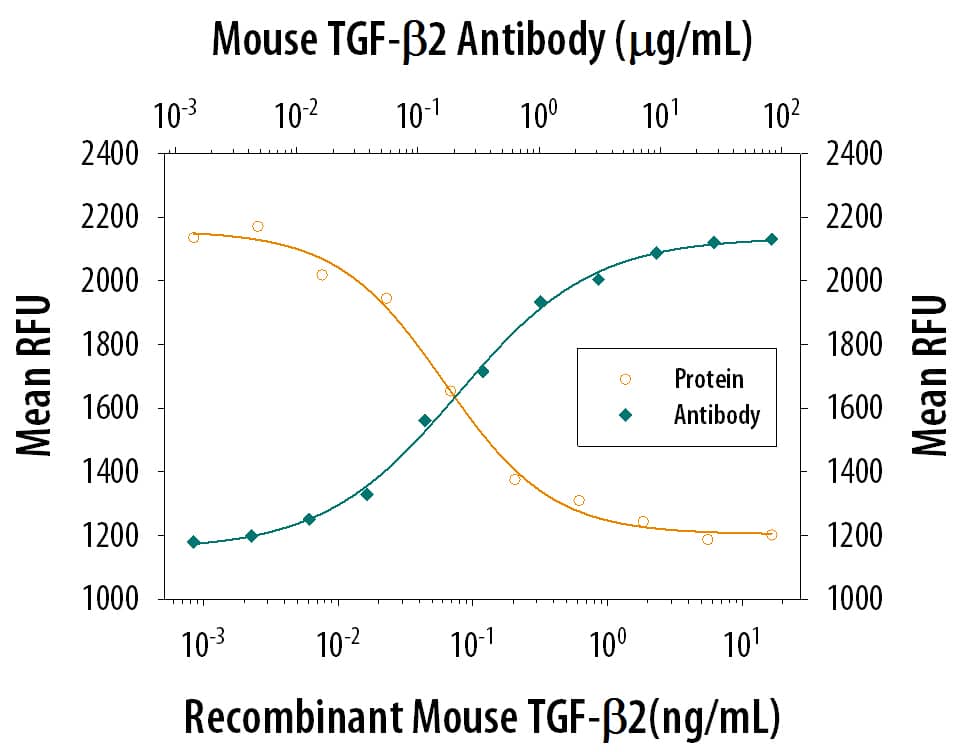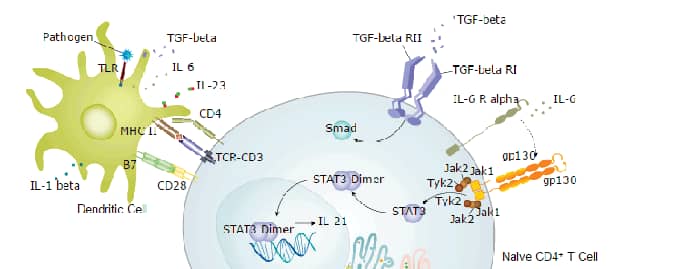Mouse TGF-beta 2 Antibody Summary
Ala303-Ser414
Accession # P27090
Applications
Please Note: Optimal dilutions should be determined by each laboratory for each application. General Protocols are available in the Technical Information section on our website.
Scientific Data
 View Larger
View Larger
TGF‑ beta 2 Inhibition of IL‑4-dependent Cell Proliferation and Neutralization by Mouse TGF‑ beta 2 Antibody. Recombinant Mouse TGF-beta 2 (Catalog # 7346-B2) inhibits Recombinant Mouse IL-4 (Catalog # 404-ML) induced proliferation in the HT-2 mouse T cell line in a dose-dependent manner (orange line). Inhibition of Recombinant Mouse IL-4 (7.5 ng/mL) activity elicited by Recombinant Mouse TGF-beta 2 (5 ng/mL) is neutralized (green line) by increasing concen-trations of Rat Anti-Mouse TGF-beta 2 Monoclonal Antibody (Catalog # MAB7346). The ND50 is typically 0.15-0.75 ug/mL.
Reconstitution Calculator
Preparation and Storage
- 12 months from date of receipt, -20 to -70 °C as supplied.
- 1 month, 2 to 8 °C under sterile conditions after reconstitution.
- 6 months, -20 to -70 °C under sterile conditions after reconstitution.
Background: TGF-beta 2
TGF-beta 2 (transforming growth factor beta 2) is one of three closely related mammalian members of the large TGF-beta superfamily that share a characteristic cysteine knot structure. TGF-beta 1, -2 and -3 are highly pleiotropic cytokines proposed to act as cellular switches that regulate processes such as immune function, proliferation and epithelial-mesenchymal transition. Each TGF-beta isoform has some non-redundant functions; for TGF-beta 2, mice with targeted deletion show defects in development of cardiac, lung, craniofacial, limb, eye, ear and urogenital systems. Mouse TGF-beta 2 cDNA encodes a 414 amino acid (aa) precursor that contains a 19 aa signal peptide and a 395 aa proprotein. A furin-like convertase processes the proprotein to generate an N-terminal 283 aa latency-associated peptide (LAP) and a C-terminal 112 aa mature TGF- beta 2. Disulfide-linked homodimers of LAP and TGF-beta 2 remain non-covalently associated after secretion, forming the small latent TGF-beta 2 complex. Covalent linkage of LAP to one of three latent TGF-beta binding proteins (LTBPs) creates a large latent complex that may interact with the extracellular matrix. TGF-beta is activated from latency by pathways that include actions of the protease plasmin, matrix metalloproteases, thrombospondin 1 and a subset of integrins. Mature mouse TGF-beta 2 shares 100% aa identity with rat TGF-beta 2, and 97% aa identity with human, porcine, canine, equine and bovine TGF-beta 2. It demonstrates cross-species activity. In most cells, TGF-beta 2 signaling begins with binding to a complex of the accessory receptor betaglycan (also known as TGF-beta RIII) and a type II ser/thr kinase receptor termed TGF-beta RII, which then phosphorylates and activates another ser/thr kinase receptor, TGF-beta RI (also called activin receptor-like kinase (ALK) -5), or alternatively, ALK-1. The whole complex phosphorylates and activates Smad proteins that regulate transcription. In bone -related cells, however, TGF-beta 2 also signals through TGF-beta RIIB (a splice variant of TGF-beta RII), independently of TGF-beta RIII. Use of other signaling pathways that are Smad-independent allows for disparate actions observed in response to TGF-beta in different contexts.
Product Datasheets
Citations for Mouse TGF-beta 2 Antibody
R&D Systems personnel manually curate a database that contains references using R&D Systems products. The data collected includes not only links to publications in PubMed, but also provides information about sample types, species, and experimental conditions.
5
Citations: Showing 1 - 5
Filter your results:
Filter by:
-
Elevated TGF β2 serum levels in Emery-Dreifuss muscular dystrophy: implications for myocyte and tenocyte differentiation and fibrogenic processes
Authors: P Bernasconi, N Carboni, G Ricci, G Siciliano, L Politano, L Maggi, T Mongini, L Vercelli, C Rodolico, E Biagini, G Boriani, L Ruggiero, L Santoro, E Schena, S Prencipe, C Evangelist, E Pegoraro, L Morandi, M Columbaro, C Lanzuolo, P Sabatelli, P Cavalcante, C Cappellett, G Bonne, A Muchir, G Lattanzi
Nucleus, 2018-01-01;0(0):1-24.
Species: Mouse
Sample Types: Whole Cells
Applications: Neutralization -
CYP4A in tumor-associated macrophages promotes pre-metastatic niche formation and metastasis
Authors: XW Chen, TJ Yu, J Zhang, Y Li, HL Chen, GF Yang, W Yu, YZ Liu, XX Liu, CF Duan, HL Tang, M Qiu, CL Wang, H Zheng, J Yue, AM Guo, J Yang
Oncogene, 2017-05-08;0(0):.
Species: Mouse
Sample Types: Cell Culture Supernates
Applications: Functional Assay -
Immunomodulatory cross-talk between conjunctival goblet cells and dendritic cells.
Authors: Contreras-Ruiz L, Masli S
PLoS ONE, 2015-03-20;10(3):e0120284.
Species: Mouse
Sample Types: Cell Culture Supernates
Applications: Neutralization -
Neutrophils increase or reduce parasite burden in Trypanosoma cruzi-infected macrophages, depending on host strain: role of neutrophil elastase.
Authors: Luna-Gomes T, Filardy A, Rocha J, Decote-Ricardo D, LaRocque-de-Freitas I, Morrot A, Bozza P, Castro-Faria-Neto H, DosReis G, Nunes M, Freire-de-Lima C
PLoS ONE, 2014-03-05;9(3):e90582.
Species: Mouse
Sample Types: Whole Cells
Applications: Bioassay -
Endothelial lineage differentiation from induced pluripotent stem cells is regulated by microRNA-21 and transforming growth factor beta2 (TGF-beta2) pathways.
Authors: Di Bernardini E, Campagnolo P, Margariti A, Zampetaki A, Karamariti E, Hu Y, Xu Q
J Biol Chem, 2013-12-19;289(6):3383-93.
Species: Mouse
Sample Types: Whole Cells
Applications: Neutralization
FAQs
No product specific FAQs exist for this product, however you may
View all Antibody FAQsReviews for Mouse TGF-beta 2 Antibody
There are currently no reviews for this product. Be the first to review Mouse TGF-beta 2 Antibody and earn rewards!
Have you used Mouse TGF-beta 2 Antibody?
Submit a review and receive an Amazon gift card.
$25/€18/£15/$25CAN/¥75 Yuan/¥2500 Yen for a review with an image
$10/€7/£6/$10 CAD/¥70 Yuan/¥1110 Yen for a review without an image








